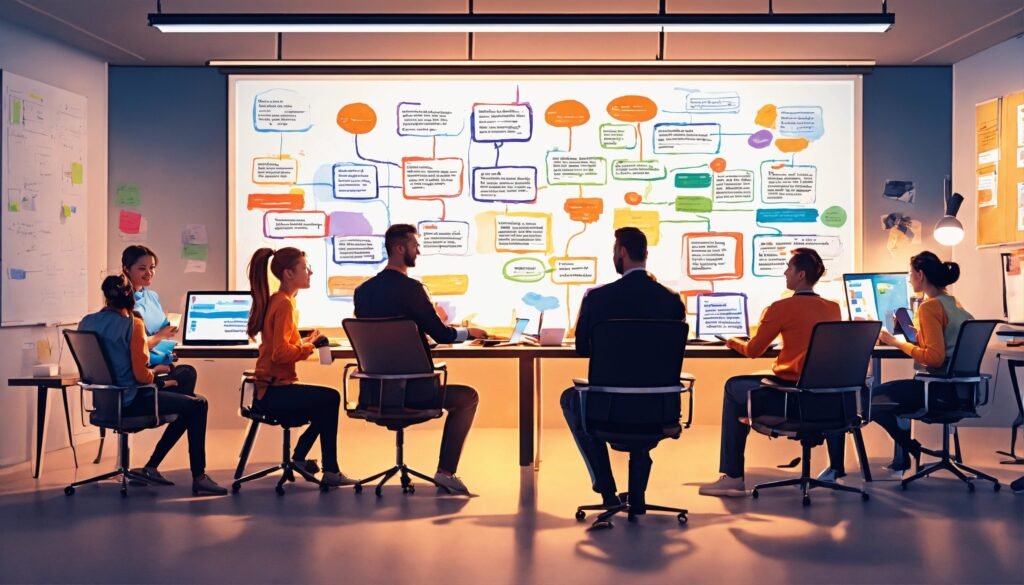Introduction
In today’s fast-paced world, professional development is more crucial than ever. But what exactly does professional development mean? Essentially, it involves learning opportunities that help individuals enhance their skills, knowledge, and expertise in their professional fields. Staying updated through professional development is vital for career advancement and personal growth.
The Evolution of Professional Development
Historical Overview
Professional development has come a long way. Historically, it involved traditional classroom settings, seminars, and workshops. These methods were effective but often limited by time and location constraints.
Modern Shifts in Learning
With the advent of technology, professional development has undergone significant changes. Modern learning methods are more flexible, interactive, and tailored to individual needs. Let’s explore the key emerging trends in professional development that are shaping the future.
Key Emerging Trends in Professional Development
Online Learning Platforms
Flexibility and Accessibility
One of the most significant shifts in professional development is the rise of online learning platforms. These platforms offer unparalleled flexibility and accessibility, allowing professionals to learn at their own pace and from anywhere in the world. Whether it’s through MOOCs (Massive Open Online Courses) or specialized training websites, online learning is transforming the way we develop professionally.
Popular Online Platforms
Platforms like Coursera, Udemy, and LinkedIn Learning have become household names. They provide a vast array of courses across different fields, making professional development more accessible than ever before.

Microlearning
Bite-Sized Learning
Microlearning breaks down complex subjects into bite-sized lessons, making learning more manageable and less overwhelming. This approach caters to the busy schedules of professionals, allowing them to learn in short, focused bursts.
Benefits of Microlearning
The benefits of microlearning include improved retention, increased engagement, and the ability to fit learning into daily routines. It’s an efficient way to keep skills sharp without dedicating large blocks of time.
Personalized Learning Paths
Adaptive Learning Technologies
Adaptive learning technologies use algorithms to tailor educational content to an individual’s learning pace and style. This personalization ensures that learners get the most out of their professional development courses.
Customizable Course Content
Courses are increasingly customizable, allowing professionals to focus on areas that are most relevant to their careers. This customization leads to more effective and targeted learning experiences.

Gamification in Learning
Engaging Learning Experiences
Gamification involves incorporating game elements into learning to make it more engaging and fun. Points, badges, and leaderboards can motivate learners to complete courses and achieve their professional goals.
Examples of Gamified Courses
Examples of gamified courses include Duolingo for language learning and Khan Academy for various subjects. These platforms use gamification to keep learners engaged and motivated.
Collaborative Learning
Peer-to-Peer Learning
Collaborative learning emphasizes interaction and knowledge sharing among peers. This approach can lead to a deeper understanding of the subject matter as learners benefit from each other’s insights and experiences.
Virtual Collaboration Tools
Tools like Slack, Microsoft Teams, and Zoom facilitate virtual collaboration, enabling professionals to learn together, even when they’re miles apart. These tools support group projects, discussions, and real-time feedback.
Focus on Soft Skills
Importance of Soft Skills
Soft skills such as communication, leadership, and emotional intelligence are becoming increasingly important in the workplace. These skills are essential for career advancement and effective teamwork.
Courses Emphasizing Soft Skills
Many professional development courses now emphasize soft skills. Programs like Dale Carnegie Training and Toastmasters focus on improving communication and leadership abilities.

Industry-Specific Professional Development
Tech Industry
Coding Bootcamps
In the tech industry, coding boot camps have gained popularity. These intensive programs teach coding and other tech skills in a short period, preparing individuals for tech careers quickly.
Continuous Tech Education
Continuous education is vital in tech, where advancements happen rapidly. Professionals must stay updated with the latest technologies and programming languages to remain competitive.
Healthcare Industry
Medical Certifications
In healthcare, obtaining and renewing medical certifications is essential. These certifications ensure that healthcare professionals maintain their competencies and adhere to industry standards.
Ongoing Medical Education
Ongoing medical education is crucial for healthcare workers to keep up with medical advancements and provide the best patient care. Programs like Continuing Medical Education (CME) offer courses to help healthcare professionals stay current.
Future Predictions for Professional Development
AI and Machine Learning Integration
Artificial Intelligence (AI) and Machine Learning (ML) are set to revolutionize professional development. These technologies can provide personalized learning experiences, predict skill gaps, and recommend relevant courses.
Virtual Reality (VR) and Augmented Reality (AR) in Training
VR and AR are making their way into professional development, offering immersive learning experiences. For example, VR can simulate real-world scenarios for training purposes, providing hands-on experience in a safe environment.
Lifelong Learning as a Standard
The concept of lifelong learning is becoming the norm. As industries evolve, continuous learning will be essential for career growth and adaptation to new challenges and opportunities.

Conclusion
The landscape of professional development is changing rapidly, driven by technological advancements and evolving workplace needs. Online learning platforms, microlearning, personalized learning paths, gamification, collaborative learning, and a focus on soft skills are among the key trends shaping the future of professional growth. Staying adaptable and embracing these trends is crucial for anyone looking to advance in their career.
FAQs
What is the main benefit of online learning platforms?
Online learning platforms offer flexibility and accessibility, allowing individuals to learn at their own pace and from any location.
How does microlearning enhance professional development?
Microlearning enhances professional development by breaking down complex subjects into manageable, bite-sized lessons, making it easier to fit learning into a busy schedule and improving retention.
Why are soft skills becoming more emphasized in professional courses?
Soft skills are essential for effective communication, leadership, and teamwork, which are crucial for career advancement and success in any professional field.
What role does AI play in future professional development?
AI personalizes learning experiences, predicts skill gaps, and recommends relevant courses, making professional development more effective and tailored to individual needs. How can one stay updated with emerging trends in professional development?
Staying updated with emerging trends can be achieved by regularly engaging in professional development courses, following industry news, and participating in relevant online communities and networks.
Summary Table of Emerging Trends
| Trend | Description | Examples |
|---|---|---|
| Online Learning Platforms | Flexible, accessible learning from anywhere | Coursera, Udemy, LinkedIn Learning |
| Microlearning | Bite-sized, manageable lessons for busy professionals | Quizlet, Blinkist |
| Personalized Learning Paths | Tailored courses using adaptive technologies | Smart Sparrow, Knewton |
| Gamification in Learning | Engaging, game-like elements in educational content | Duolingo, Khan Academy |
| Collaborative Learning | Peer-to-peer interaction and virtual collaboration tools | Slack, Microsoft Teams, Zoom |
| Focus on Soft Skills | Emphasis on essential interpersonal skills for career advancement | Dale Carnegie Training, Toastmasters |
| AI and Machine Learning Integration | Personalized learning experiences and skill gap prediction | Coursera’s AI, EdX’s ML courses |
| VR and AR in Training | Immersive learning experiences through virtual and augmented reality | Oculus for Business, ARKit |
| Lifelong Learning as a Standard | Continuous learning throughout one’s career to adapt to evolving industries | MOOCs, Professional Certifications |
